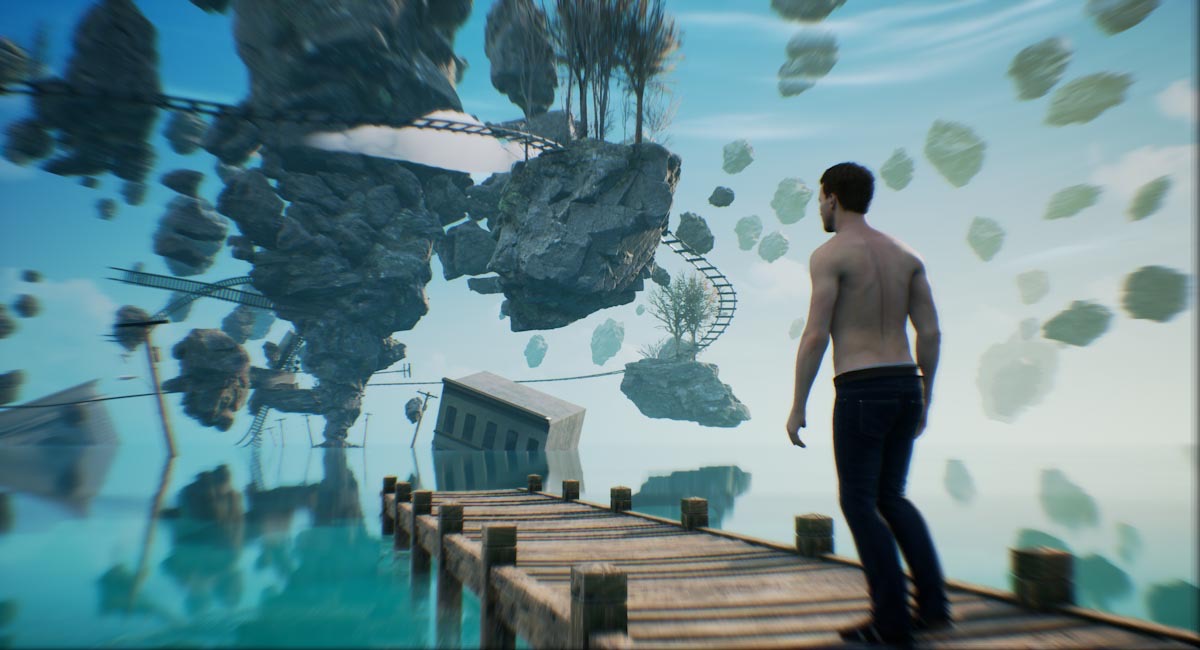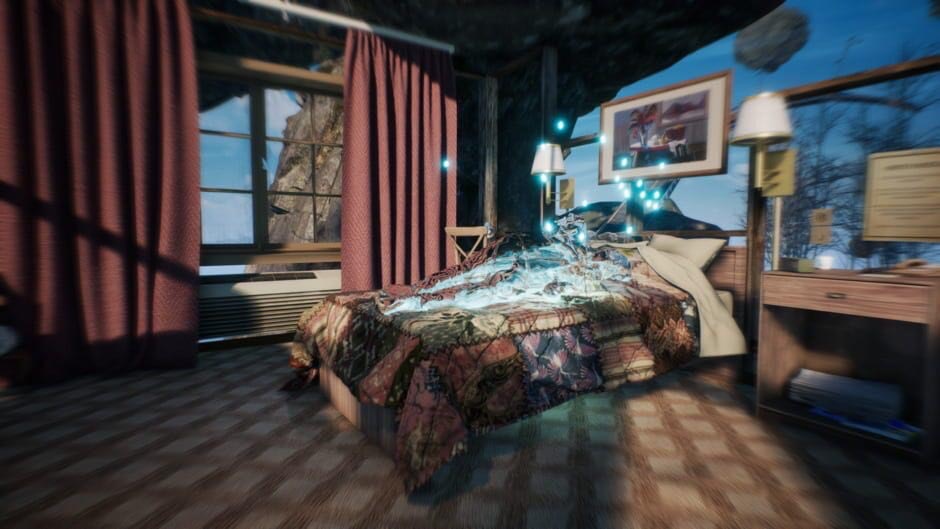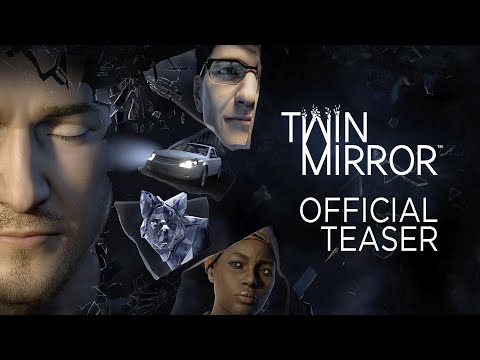Despite being relatively fresh-faced, developer DONTNOD has managed to carve out their own space in the industry, releasing some of the best narrative experiences episodic games has to offer. From the episodic teenage escapade Life is Strange to the award-winning Tell Me Why, DONTNOD’s tried and true is an inherent success that has placed both anticipation and expectation on DONTNOD’s latest project, Twin Mirror, which has been touted to be a culmination of everything the developer has achieved throughout the past decade.
Paying homage to the world of investigative thrillers and crime drama, Twin Mirror follows the story of Sam Higgs, a small-town journalist who fled after publishing a report that condemned the safety of the local mining industry – ultimately leading to its closure. After hearing of the death of his friend and former colleague Nick, Sam decides to return to his home town of Basswood to pay his respects, only to find that the circumstances surrounding his death don’t add up. Reluctantly, Sam quickly finds himself wrapped up in a conspiracy that has manifested within the shadows and struggles that he left behind.
Twin Mirror is everything we’ve come to expect from a DONTNOD interactive drama, with investigative gameplay and intricate dialogue trees acting as structural pillars for its dramatic narrative. At its core, Twin Mirror bears an uncanny mechanical resemblance to prior DONTNOD adventures, with the same modern point and click mechanics. You’ll spend most of the game discovering items of which will either fill in narrative blanks or serve as a means to solve a puzzle.
While previous games like Life is Strange featured quirky mechanics based on supernatural abilities, Twin Mirror instead opts for metaphorical subtlety – in the form of the inner workings of the protagonist’s mind. As a protagonist, Sam appears to be neurodivergent, with no specific given in terms of conditions or diagnoses. Sam is inflicted with intrusive thoughts throughout the game, as well as panic attacks and depictions of anxiety, all of which take the guise of either gameplayer segments or mechanics.
As someone who personally lives with some of these conditions, I have mixed feelings concerning how they’re depicted in this game. While their inclusion feels like a step in the right direction for awareness of mental health issues, it also feels like a missed opportunity to make it a meaningful part of the game, rather than a mechanical quirk that the player must overcome.
There are two main apparitions that feature as mechanics to be used by the player, one of which takes the form of Sam’s alter ego, simply known as ‘Him’. This mirror image of Sam appears to be both intrusive and resourceful, providing players with its own opinion in regards to our decisions – which can both help and hinder situations. In addition to this, Sam will also frequently visit his cognitive ‘Mind Palace’, which serves as a way to fill in historic narrative gaps, as well as allowing Sam to hypothesise using clues in the real world.

Unfortunately, these mechanics suffer from a strong case of style over substance. Having an alter ego with a questionable agenda is intriguing at first, yet his importance feels half-baked. At most, Sam’s secondary personality feels like an annoying voice nattering in your ear, serving as more of an internal argument than something the player should be wary of. Additionally, Sam’s ‘Mind Palace’ is also lacklustre, with its usage being relegated to a psychological interlude between game chapters, rather than a place of significance or consequence.
Speaking of consequence, Twin Mirror seems to keep negative outcomes to a minimum, with repercussions often feeling subtle. Sure, there are a few key moments in the game which have the potential to go horribly wrong, but ultimately, the experience feels like it’s on narrative rails. One segment of the game has you plan a distraction within your ‘Mind Palace’, yet instead of letting you choose a plan that will fail, the player instead gets to play around with the sequence of events until they get it right. It’s moments like this in Twin Mirror that make the whole experience feel narratively on rails, stripping it of any immersive interactivity.
Assuming control of Sam during your investigations feels fine for the most part, however, there are some aspects to Twin Mirror’s gameplay that feel clunky and cumbersome. When using a controller, the camera used to find selectable objects is rather finicky, with item descriptions and prompts frequently failing to appear. In terms of movement, Sam can only walk at a brisk pace the majority of the time, with the ability to run only being briefly available during specific segments. While these are minor issues, they can feel more frustrating than immersive, especially if you’re walking around in circles, trying to solve a puzzle.

Mechanics aside, Twin Mirror features gorgeous visuals, accompanied by great voice acting and writing. While the game’s playtime is fairly brief, each locale and its associated inhabitants make the experience feel akin to watching a real-life thriller. As you’d perhaps expect, replayability can be found within changing your in-game actions to create some sort of butterfly effect, which may or may not alter the game’s turn of events. The story embedded within this rich and detailed world of video game realism, however, is not as thrilling as you might have been anticipating.
Sam’s homecoming is the spark that ignites what turns out to be a rather weak plot, which burns more like tame pilot light than an unpredictable blaze. In his shoes, the player has to confront the animosity the town has for him, as well as work alongside his ex-girlfriend to solve the mystery behind Nick’s untimely demise. This is straight-up an ordinary murder mystery story, with basic twists and reveals that keep a tight hold of the reigns, preventing it from going a bit bananas with anything unrealistic. Twin Mirror is less Twin Peaks and more day time TV drama, which is fine as long as you weren’t expecting the latter.
If you’re a fan of narrative video game experiences, no matter how exciting or unique, then you’ll likely enjoy Twin Mirror for what it is. On the other hand, if you’re looking for an ominous thriller that draws from the supernatural elements of Life is Strange, this is not it. While Twin Mirror does touch on some interesting real-life issues while attempting to visually mechanise cognitive thought processes and mental health afflictions, it fails to do anything meaningful with them. Despite its fantastic visuals and high-quality voice acting, Twin Mirror is best kept as a curiosity for fans of the genre, rather than a must-play, breakthrough experience.


